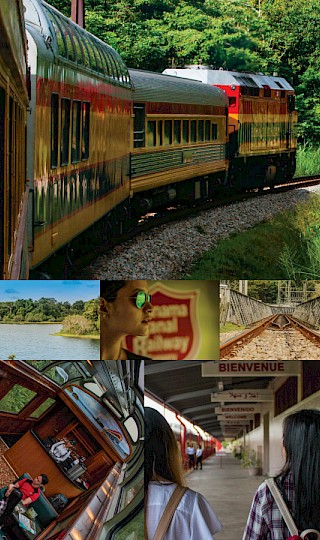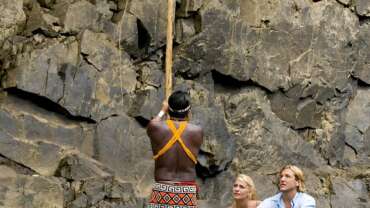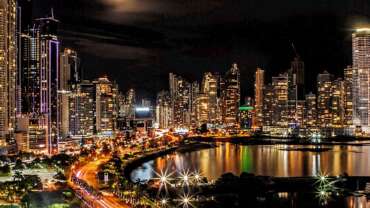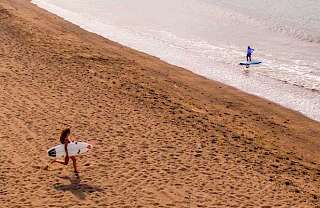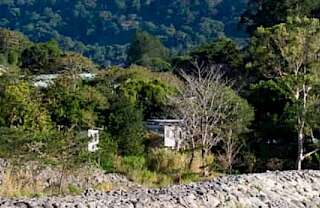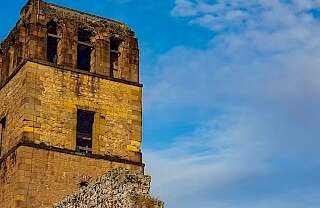Cultural Tourism in Panama
Through time, the Panamanian identity was forged in a great encounter of races and cultures; Spaniards, Amerindians, Africans, Afro-Antilleans and people from many countries found in the Isthmus the best harmony, peace and tolerance that will swell life.
The Hispanic heritage beats especially in the regions of Azuero and Coclé where tradition and culture is highly valued. The African legacy dazzles in the showy Congo dances, a tradition settled in the province of Colon, while the native peoples keep alive their roots.
GASTRONOMY & RESTAURANTS
Panama City has been a UNESCO Creative City in Gastronomy since 2017, and for good reason. Foodie or not, you’ll want to experience the uniquely Panamanian cuisine, comprising flavors, dishes and ingredients from Panama’s African, Spanish and Native influences. For some of the best restaurants in the city, head to UNESCO World Heritage site, Casco Antiguo. This is where the country’s traditions collide to give you the best of Panamanian cuisine made by world-class chefs.
While you’re in town, make sure to try the Ceviche. This classic seafood dish is made of raw fish cured in citrus juices and spiced with chili peppers. For something hardier, ask for the Ropa Vieja—a spiced beef dish, or the traditional Panamanian soup known as Sancocho. Breakfast in Panama usually means eggs, meat, tortilla, fruit and coffee, but if you want something sweeter, get some Hojaldras—a kind of fried bread sprinkled with powdered sugar. For snacks and side dishes you can’t go wrong with Yuca Frita (yuca fries,) or the delicious twice-fried plantains, known as Tostones. And of course, plan to enjoy plenty of delicious seafood and tropical fruit while visiting Panama.
TABOGA ISLAND
Isla Taboga, or the Island of Flowers, is a volcanic island characterized by rich tropical plant life, as well as beautiful beaches and soft sand. Located on the Pacific side of the country in the Gulf of Panama, this majestic island is a short 20 kilometers from the capital, making it the best one-day getaway from Panama City.
Take in the beauty of the island by starting your trip with a hike to one of Isla Taboga’s highest points, Cerro Vigia or Cerro de la Cruz. Next, explore the colorful and historic Spanish-founded town, which is also home to the second oldest church in the Western hemisphere. After all that exploration, take a load off at one of the laid-back Taboga Island beaches, or grab a drink at one of the quaint beach bars nearby.
PANAMA CANAL
Arguably the most famous attraction in Panama is the Panama Canal. As one of the 7 Wonders of the Modern World, the Panama Canal is a must-see for anyone traveling in the country. Built to dramatically decrease the travel time for ships between the Pacific Ocean and Caribbean Sea, the Canal has seen over 900,000 vessels and counting. At one point this engineering miracle was considered impossible to build, but today, you can see it for yourself.
Did you know that the The Canal uses a lock system to lift ships up 85 feet to the elevation of the canal? How about the fact that it takes 8-10 hours for each ship to make the transit through the canal? Learn about all of this and more at the visitor center at Miraflores, where you can watch an IMAX documentary of the history of the canal narrated by Morgan Freeman. At Miraflores, you’ll also be able to watch the ships in transit just a few meters away.
For another vantage point, visit the Agua Clara Visitor’s Center on the Atlantic side of the Canal in Colón. Here, you’ll be able to see both the ships and the canal. Agua Clara is also where the brand new, larger locks are housed. Consider making a day of it, by canoeing The Chagres river afterwards, where you can visit the indigenous Emberá community in the Panama Canal watershed. Want the full Canal experience? While in Panama City, you can even organize a crossing of the Canal as a day trip to see the locks from a new perspective.
PANAMA VIEJO
Venture to the eastern suburbs of Panama City and you’ll find the remaining parts of the original Panama City, and former capital of the country. Now a UNESCO Cultural World Heritage Site, the settlement dates back to 1519, when Pedro Arias Dávilla and 100 other inhabitants made it their home. The area now known as Panama Viejo was the first permanent European Settlement on the Pacific Ocean.
When you get there, explore the archeological site of Panama Viejo to see the Old Panama Cathedral, as well as various historical ruins. Next, climb atop the iconic bell tower and look at the Panama City skyline from the city’s original “skyscraper.” As you wander, keep in mind that the layout and scale of Old Panama remains largely unchanged from the original form, and no architectural renovations have been made—this means you’ll have the rare opportunity to walk through history. While you’re there, take some time to shop at the artisan market, where you can pick up local crafts and souvenirs.
CASCO ANTIGUO
Experience the historical, charming and vibrant neighborhood of Casco Antiguo. Casco Antiguo, also known as Casco Viejo, or the ‘old quarter,” is Panama City’s historic district. Considered a UNESCO Cultural World Heritage Site, the district dates back to 1673, and features vibrant plazas and picturesque brick-paved streets surrounded by colorful buildings. The area is ideal for walking, discovering history and enjoying a variety of fine cuisine. Come for some of the city’s best gastronomy, culture and photo opps, and stay to mingle with the locals in the heart of the nightlife scene.
Start your visit with a lively walk through the neighborhood. You’ll encounter some religious history at the Metropolitan Cathedral of Panama City located in the main square, Plaza Mayor, as well as the Church of San Jose, famous for its amazing golden altar. As you walk, make sure to stop at Plaza de Francia, a beautiful plaza that pays homage to the French role in the construction of the Panama Canal. The plaza is also home to Las Bóvedas, a monument that was once used as a defense against pirate attacks. Next, visit Paseo Esteban Huertas, where you’ll get pristine views of the city skyline and bay.
Casco Antiguo is also home to several of the city’s top museums, including the Museo del Canal (The Canal Museum), and the Museo de la Mola, featuring the traditional textile art made by the Guna indigenous group. You’ll also find the iconic stone archway at Arco Chato, which is the remains of a church built by Dominican friars, and a beautiful photo opportunity. Next, be sure to visit the Panama National Theater to see the stunning ceiling frescoes painted by Robert Lewis. On your walk, you’ll also get the chance to do some shopping, with opportunities to buy local crafts and visit high-end boutiques.
When you get hungry, you’re in luck. Casco Viejo is home to the heart of the gastronomy scene in Panama City. You’ll be met with the smells of grilled seafood wafting through its historic streets, and you’ll get to try some of Panama’s best dishes, as well as cuisine from all over the world made by premiere chefs. After dinner, check out the nightlife scene, or take in the sunset with views of the capital from one of the amazing rooftop bars overlooking the city.
AGUA CLARA VISITOR’S CENTER
25 minutes from the city of Colon, the Clear Water Locks waits for you and all those who want to know the functioning of a modern engineering work that unites the world, “The Panama Canal.”
From the visitor center you can see a panoramic view where two scenarios are contrasted: Gatun Lake and the extension work already completed.
BOQUETE
Boquete is a natural setting with cool temperatures that invite you to enjoy its exquisite award-winning delicacy worldwide: coffee. The fluttering and chirping of the birds, calls you to walk the paths while mother nature invades your senses. Its hanging bridges and relaxing walks, its crystal clear waters, and its abundant and diverse flowers become part of your experience in Boquete.
PORTOBELO
Portobelo was the most important colonial port in the Panamanian Caribbean and today it is the capital of the Congo culture. Between the 16th and 18th centuries, Portobelo received the galleons from Spain and loaded them with the gold and silver of the Americas. The arrival of the richest fleet in the Caribbean made it the commercial hub of the region and the target of enemy nations, pirates and corsairs. Many of them, such as Sir Francis Drake, met their end and are still in this place. The Spanish soldiers are gone, but the culture-rich Congo community remains. Their dances and songs are now Portobelo’s greatest wealth, and the old forts are Portobelo’s greatest stages.
Together with San Lorenzo, Portobelo was declared a UNESCO World Heritage Site in 1980.
SAN LORENZO
San Lorenzo guards the ruins of the most powerful Spanish fort in Panama, between the jungle and the sea. Built in 1601 by orders of the King of Spain, the Castillo de San Lorenzo el Real guarded the entrance and exit of the main route of the Americas. Countless riches were transported by the Chagres River, which, together with Camino de Cruces by land, formed a vital communication route between the two oceans. Its massive walls did not stop the attack of Welsh privateer Henry Morgan, who captured it in 1671 before heading to Panama City. Today its ruins are part of an exuberant setting of tropical rainforest, which also surrounds the remains of the old Canal fortifications.
EL CAÑO ARCHAEOLOGICAL PARK
El Caño Archaeological Park shows what Panama’s ancient societies were like before the conquest. The archaeological site, where excavations and studies are still being carried out, includes an extensive necropolis with funerary mounds and a ceremonial center with alignments of basalt columns that were used between the years 700 and 1000 CE. A new site museum presents the most recent archaeological discoveries , which include tombs of chiefs dressed in gold and thousands of pieces in polychrome ceramics. The largest tomb contained at least 25 bodies: the most important was covered with pieces of gold and copper, and pieces carved in stone, bone and ivory. The abundance and quality of the finds have made El Caño the most important archaeological site in Panama.
PANAMA RAILWAY
The Panama Railway traverses the Isthmus of Panama and it was the world’s first transcontinental railroad. It was inaugurated in 1855 before the Canal was built, and it transported thousands of people and tons of cargo between the city of Aspinwal (present-day Colon) and Panama City. During the Gold Rush, it was boarded by countless adventurers and settlers from the east coast of North America bound for California. Seduced by the promise of fortune, these travelers made the railroad the most profitable of all time. Each adult had to pay an exorbitant fee of 25 dollars (more than 800 dollars today) for just a four-hour, 50-mile trip. The railroad later played an essential role during the construction of the Canal, and today it moves containers between the Atlantic and Pacific ports. In its passenger train, it is possible to make the journey between the two oceans in one hour, through the forest of Soberania National Park and bordering Gatun Lake and the Panama Canal.



